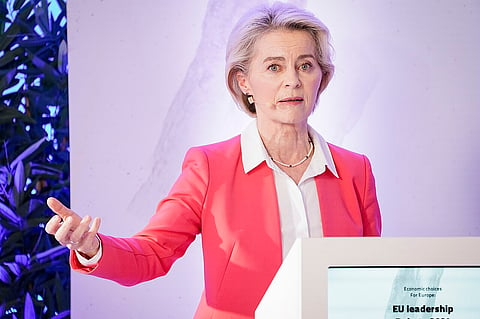

The European Commission has decided to phase out the term "Rearm Europe" to describe its multi-billion-euro defense initiative following criticism from Italian and Spanish leaders, who argued the name was overly provocative and risked alienating citizens. The initiative, aimed at bolstering defense capabilities across the bloc, will now be referred to as "Readiness 2030," reflecting the timeline by which Russia could potentially develop the capacity to attack an EU or NATO member state.
The rebranding comes as the Commission also unveiled details of a €150 billion low-interest loan program, dubbed "SAFE," designed to facilitate the purchase of advanced weapons and ammunition. Additionally, the Commission has proposed relaxing fiscal rules to mobilize up to €650 billion, bringing the total funding for the initiative to €800 billion.
A Name Change to Reflect Broader Goals
The decision to abandon the term "Rearm Europe" was made after Italian Prime Minister Giorgia Meloni and Spanish Prime Minister Pedro Sánchez voiced strong objections, arguing that the name failed to capture the broader scope of the initiative. Meloni, speaking to the Italian Senate on Tuesday, emphasized that strengthening Europe's defense capabilities goes beyond simply purchasing weapons. "We are called to strengthen our defense capabilities, but today this doesn't mean trivially buying armaments," she said. "Operability, essential services, energy infrastructures, supply chains—all these are critical and cannot be addressed with weapons alone."
Sánchez echoed these sentiments during a summit of EU leaders in Brussels, where defense was a key agenda item. "I don't like the term 'rearming.' I think it's an incomplete approach," he said on Thursday. "Defense can be explained under a much broader umbrella, which is security." He highlighted the need to include areas such as cybersecurity, anti-terrorism, quantum computing, artificial intelligence, and satellite connections in the initiative.
A Rapid Rebranding Effort
The rebranding process unfolded swiftly. When European Commission President Ursula von der Leyen first announced the €800 billion project on March 4, she exclusively used the term "Rearm Europe," stating, "We are in an era of rearmament. And Europe is ready to massively boost its defense spending." However, by the time the Commission presented the legal texts for the plan earlier this week, the name had already shifted to "Rearm Europe Plan/Readiness 2030."
Von der Leyen appeared receptive to the criticism during the Brussels summit, hinting at the imminent name change. "It's a much wider scope, the approach that we're taking," she said, referencing electronic warfare, cybersecurity, and telecommunications. "Therefore, the name 'Readiness 2030.'"
A Broader Vision for European Security
The new name, "Readiness 2030," is intended to reflect a comprehensive approach to strengthening Europe's defense and security infrastructure by the end of the decade. Commission spokesperson Paula Pinho emphasized the importance of clear communication. "We are sensitive to the fact that the name as such may trigger some sensitivities in some member states," she said on Friday. "If this makes it more difficult to convey the message to all citizens in the EU of the need to take these measures, then we are all ready not only to listen but also to reflect it in the way we communicate."
The initiative now aims to address a wide range of security challenges, from traditional military threats to emerging risks in cyberspace and critical infrastructure. As Sánchez noted, "The drones that can be used in the event of a conflict, as it's happening in eastern Ukraine, can also be used to fight wildfires. We need to educate people about the fact that when we talk about security and defense, we're fundamentally talking about technology."
With the rebranding, the European Commission seeks to align its messaging with the broader goals of the initiative while addressing the concerns of member states and ensuring public support for the ambitious plan.